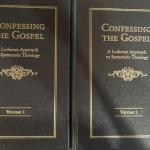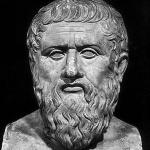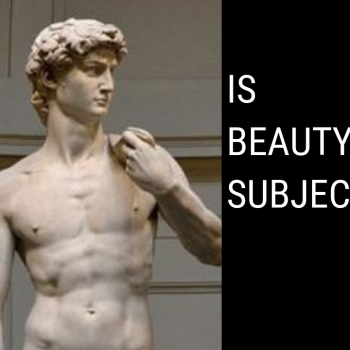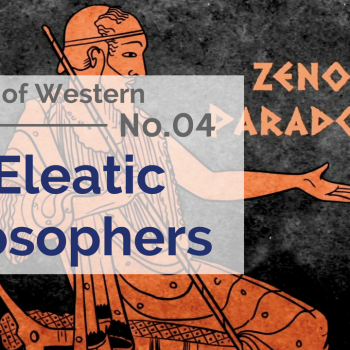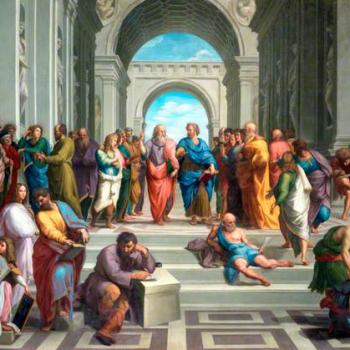“What hath Athens to do with Jerusalem?” The old question attributed to Tertullian has been answered in several ways throughout the centuries as Christian thinkers have had to make decisions surrounding the usefulness of philosophy. Thinkers such as Origen and Clement of Alexandria tended to adopt such a strong adherence to Platonic ideas that Scripture was squeezed into a particular philosophical mold into which it didn’t always fit. Others have argued for the complete divorce of theology from philosophy. In my doctoral research on scholasticism, I have increasingly encountered modern thinkers who disparage philosophy, lamenting the Protestant scholastic era as one which imposed foreign categories over the Biblical text. The irony in this is that those same writers who criticize the use of Aristotle (as one example) themselves are beholden to certain philosophies. They just happen to be different ones.
No one can engage in any intellectual endeavor apart from philosophy. The average individual in any given society has certain concepts of being, knowledge, and ethics that have been adopted, likely without any critical examination whatsoever. The concepts first explained by academic philosophers tend to slowly move into the consciousness of society, whether one recognizes such influences or not. Because of such prejudices, when one rejects classical philosophy for a pure Biblicism, the result is usually that they have simply adopted the current philosophical trends without recognizing it. The more I read, the more obvious this becomes.
 One example of this is the criticisms leveled against the ordo salutis. In contemporary disparagement of scholastic thought, theologians are quick to condemn any concept of an order of salvation as beholden to Aristotelian ideas of causation. Such might make a convincing argument at first glance, as terms such as efficient and final causality are not found in the Biblical text. However, one cannot just reject Aristotle’s notion of causation without simultaneously adopting some other idea of the concept. Language of cause and effect is common in casual conversation, and is apparent Scripturally. Thus, there is a necessity to interpret what such an idea means. That this happens is apparent in criticisms of the scholastics which contend that the ordo salutis necessitates some kind of temporal sequence of events in the application of redemption. In the Aristotelian conception, temporality is not part of causation. The timing of cause and effect are simultaneous. For example, when I put my foot on the gas pedal, the car is speeding up at the same time that my foot is pressed down. My foot is a cause of the motion of the car, not in a temporal sense, but because it logically precedes the latter event. However, in David Hume’s rejection of Aristotle’s theory of causes, he redefines this notion in a temporally-sequential manner. Through observation, one notes that when a specific event occurs, another event follows such an occurrence. Thus, the relationship of cause and effect is a time-bound one, wherein one sequence (the cause) temporally precedes another (the effect). In modern writers, Hume’s ideas of causality are simply assumed, and Aristotle’s are rejected as an imposition of philosophy. In reality, no one can actually escape these philosophical concerns.
One example of this is the criticisms leveled against the ordo salutis. In contemporary disparagement of scholastic thought, theologians are quick to condemn any concept of an order of salvation as beholden to Aristotelian ideas of causation. Such might make a convincing argument at first glance, as terms such as efficient and final causality are not found in the Biblical text. However, one cannot just reject Aristotle’s notion of causation without simultaneously adopting some other idea of the concept. Language of cause and effect is common in casual conversation, and is apparent Scripturally. Thus, there is a necessity to interpret what such an idea means. That this happens is apparent in criticisms of the scholastics which contend that the ordo salutis necessitates some kind of temporal sequence of events in the application of redemption. In the Aristotelian conception, temporality is not part of causation. The timing of cause and effect are simultaneous. For example, when I put my foot on the gas pedal, the car is speeding up at the same time that my foot is pressed down. My foot is a cause of the motion of the car, not in a temporal sense, but because it logically precedes the latter event. However, in David Hume’s rejection of Aristotle’s theory of causes, he redefines this notion in a temporally-sequential manner. Through observation, one notes that when a specific event occurs, another event follows such an occurrence. Thus, the relationship of cause and effect is a time-bound one, wherein one sequence (the cause) temporally precedes another (the effect). In modern writers, Hume’s ideas of causality are simply assumed, and Aristotle’s are rejected as an imposition of philosophy. In reality, no one can actually escape these philosophical concerns.
The idea of causality is simply one example among many. I am convinced, for example, that the various strands of the “Theology of Hope” popular in the later twentieth century are inherently Hegelian. That is not to say that such thinkers purposefully echo the thoughts of Hegel. However, Hegel’s prioritization of becoming over the Aristotelian-Platonic concepts of being is, I think, a necessary backdrop for the developments of such ideas. To be a theologian is also to be a philosopher, whether one wants to affirm such a reality or not. We simply have to be self-aware enough to express what that philosophy is.

